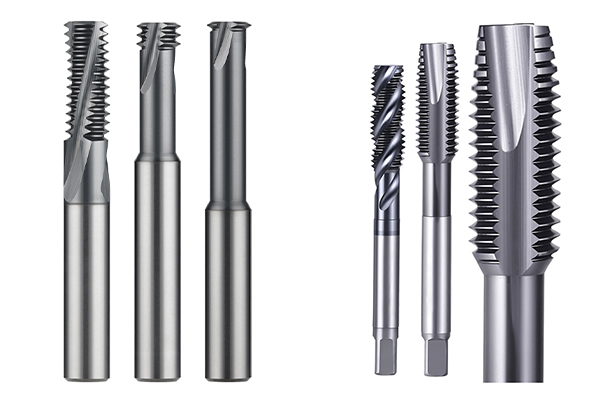In modern manufacturing, thread machining is a critical process that directly impacts product quality and efficiency. Yet, engineers and procurement managers often face a dilemma: thread mill or tap? Both tools have distinct advantages, but which one suits your application best? This comprehensive guide compares their performance and offers practical selection advice.

Why Choose a Thread Mill? – Multifunctionality Meets High Precision
Reduce Inventory Costs with Versatility
Unlike taps, a single thread mill can machine multiple thread sizes within the same pitch range. This flexibility minimizes tool inventory and lowers maintenance costs. For instance, aerospace manufacturers frequently use thread mills to handle diverse thread specifications effortlessly.
Conquer Challenging Materials
Thread mills excel with tough materials like titanium alloys and stainless steel. Their controlled chip management prevents clogging, reducing workpiece damage and tool wear. Additionally, lower heat generation enhances machining stability.
Broken Tool? No Problem!
If a thread mill breaks, reprogramming the tool path can often salvage the thread—saving high-value parts from scrap. This feature drastically reduces rework costs in precision industries.
Ideal for High-Tolerance Applications
For industries demanding micron-level accuracy (e.g., aerospace or medical devices), thread mills deliver unmatched precision, ensuring every thread meets strict standards.
Why Choose a Tap? – Speed and Cost Efficiency Combined
Boost Productivity with Rapid Machining
Taps are renowned for their speed. In mass production (e.g., automotive parts), they can complete a threaded hole in seconds, maximizing throughput.
Budget-Friendly Solution
Taps require significantly lower upfront investment than thread mills, making them ideal for standard threads in cost-sensitive operations.
Simple Operation, Minimal Training
Taps need no complex programming—just align, apply torque, and start machining. This simplicity makes them perfect for SMEs and beginners.
Tailored Solutions for Every Material
From hand taps to spiral-flute taps, there’s a tap optimized for every material (aluminum, cast iron, etc.), ensuring optimal performance.
Thread Mill vs. Tap: Which Reigns Supreme?
Prioritize Flexibility and Precision? Choose Thread Mills
For multi-size threads or tough materials, thread mills outperform with superior accuracy and longer tool life, reducing long-term costs.
Need Speed and Affordability? Opt for Taps
In high-volume production with moderate tolerance requirements, taps offer unbeatable efficiency and cost savings.
How to Make the Right Choice?
1. Evaluate Material Properties
- Thread mills excel with titanium/stainless steel.
- Taps suffice for softer materials like aluminum.
2. Analyze Production Scale
- Small-batch/multi-variety production: Thread mills.
- Mass production: Taps.
3. Balance Budget and Quality
While thread mills have higher initial costs, their ROI often surpasses taps. Assess total lifecycle value.
Conclusion: No Clear Winner—Only the Smartest Fit
Whether you choose a thread mill or tap depends on your specific needs. For further guidance, contact our technical team for personalized recommendations!

